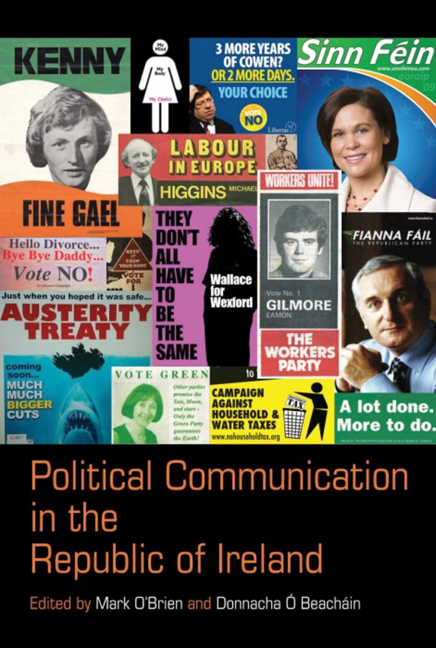Book contents
- Frontmatter
- Contents
- List of Illustrations
- Glossary
- Notes on Contributors
- Acknowledgements
- Introduction
- Part One Political Communication and Politicians
- Part Two Political Communication and Journalism
- 5 ‘Sources say …’: political journalism since 1921
- 6 In sickness and in health: politics, spin, and the media
- 7 Media advisers and programme managers
- 8 A limited focus? Journalism, politics, and the Celtic Tiger
- Part Three Political Communication and the Public
- Conclusion
- Index
7 - Media advisers and programme managers
from Part Two - Political Communication and Journalism
- Frontmatter
- Contents
- List of Illustrations
- Glossary
- Notes on Contributors
- Acknowledgements
- Introduction
- Part One Political Communication and Politicians
- Part Two Political Communication and Journalism
- 5 ‘Sources say …’: political journalism since 1921
- 6 In sickness and in health: politics, spin, and the media
- 7 Media advisers and programme managers
- 8 A limited focus? Journalism, politics, and the Celtic Tiger
- Part Three Political Communication and the Public
- Conclusion
- Index
Summary
On 29 September 2008, in a process shrouded in secrecy, the Irish government issued an unlimited bank guarantee to six banks. This would ultimately cost the Irish taxpayer billions of euros. Two years later, on 21 November 2010, Taoiseach Brian Cowen formally requested financial assistance for Ireland through the European Union's economic financial stability facility (EFSF) and the International Monetary Fund (IMF). One week later, the government, the European Union, and the IMF agreed to an €85 billion rescue deal, the EU–IMF bailout package. On that day, 88 years after the foundation of the state, Ireland relinquished its fiscal and budgetary sovereignty.
From that moment, Ireland entered one of the most prolonged and fraught crises of its political, fiscal, and social history. This chapter explores the communications role of politically appointed Irish government media advisers during this period of unprecedented national crisis from 2010 until 2012. This period encompasses a change of government in Ireland and the chapter includes a comparative analysis of the role of media advisers during the Fianna Fáil-led government under Brian Cowen and the subsequent Fine Gael-led government under Enda Kenny. The findings in relation to status and role, value for money, and ethical probity (in relation to the public interest) contained in this chapter are based on two sets of interviews conducted with Irish political correspondents in 2010 and 2013. In all, 15 political correspondents were interviewed – out of a total number of 46 in the Oireachtas press gallery. The interviews were conducted on the basis of anonymity. A variety of journalists were selected for interview with a mix of male and female interviewees working for both tabloid and broadsheet print media, along with correspondents (radio and television) from commercial and public sector broadcasters. In 2010, 11 out of a possible 13 politically appointed media advisers were also interviewed on the basis of anonymity. Politically appointed media advisers and programme managers made their first appearance on the Irish political landscape in 1993 when several such positions were created by members of the incoming Fianna Fáil–Labour Party coalition. Reporting at the time, Geraldine Kennedy (1993a), public affairs correspondent of the Irish Times, noted ‘[T]he majority of Ministers have appointed their new partnership programme managers, a new layer of advisers charged with the specific task of monitoring, implementing and coordinating work on the implementation of the programme for government in a continental-type cabinet system’.
- Type
- Chapter
- Information
- Political Communication in the Republic of Ireland , pp. 115 - 128Publisher: Liverpool University PressPrint publication year: 2014



